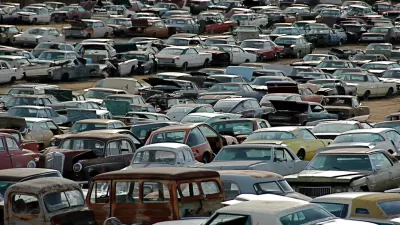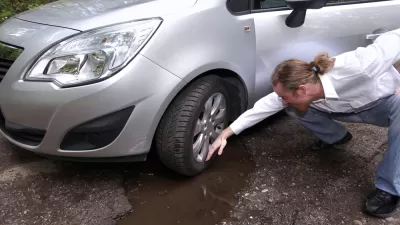The Great Recession ended in the summer of 2009. Unemployment has fallen and consumer spending has risen, as have most economic metrics save one: vehicle miles traveled. There is a list of reasons why VMT hasn't risen, and perhaps won't.

Are the signs of peak driving, i.e., peak vehicle miles traveled (VMT), here to stay or is it just an aberration and the metric will begin increasing, i.e., it is a 'lagging indicator'?
Fortune's Chris Matthews cites five reasons given by "Behind the Numbers" (sorry, subscription only, but Matthews kindly lists them) that explain why driving hasn't increased as have most metrics, e.g. gross domestic product, since the Great Recession ended. He admits to being surprised that it "has been stagnant for almost seven years" (see graph):
The only other time in history that we've seen a similarly long time between the peak and trough was following the 1982 recession, in which it took 39 months for total vehicle miles traveled to recover to its previous peak. It’s now been more than twice that amount of time since we reached the all-time high in vehicle miles driven, and unlike the case in the 1980s, we don’t have the excuse of a recent gas-tax hike to blame for it.
"So, what is going on here?" asks Matthew incredulously. "In a note to clients (August 14), independent research firm Behind the Numbers argued that we’re entering a new era in which Americans simply prefer to drive less." They write:
It’s unlikely that miles driven is a lagging indicator that will eventually return to its prior trend. There is ample evidence that a 60-year trend of increased per capita driving has ended…. Among the reasons a sharp reversal is unlikely:
- Boomers are getting older and driving less.
- Millennials are less interested in driving, and are now the largest generation in the US.
- The trend toward living near the urban core reduces the need for driving.
- Higher gas prices discourage driving.
- Mass transportation is winning over more consumers.
However, Matthews proceeds to dispel some of these reasons, and concludes by writing, "There’s plenty of reason to believe that America’s love affair with the car is beginning to cool, but it’s probably a bit early to declare this case closed."
FULL STORY: Have Americans really fallen out of love with driving?

Planetizen Federal Action Tracker
A weekly monitor of how Trump’s orders and actions are impacting planners and planning in America.

Congressman Proposes Bill to Rename DC Metro “Trump Train”
The Make Autorail Great Again Act would withhold federal funding to the system until the Washington Metropolitan Area Transit Authority (WMATA), rebrands as the Washington Metropolitan Authority for Greater Access (WMAGA).

The Simple Legislative Tool Transforming Vacant Downtowns
In California, Michigan and Georgia, an easy win is bringing dollars — and delight — back to city centers.

The States Losing Rural Delivery Rooms at an Alarming Pace
In some states, as few as 9% of rural hospitals still deliver babies. As a result, rising pre-term births, no adequate pre-term care and harrowing close calls are a growing reality.

The Small South Asian Republic Going all in on EVs
Thanks to one simple policy change less than five years ago, 65% of new cars in this Himalayan country are now electric.

DC Backpedals on Bike Lane Protection, Swaps Barriers for Paint
Citing aesthetic concerns, the city is removing the concrete barriers and flexposts that once separated Arizona Avenue cyclists from motor vehicles.
Urban Design for Planners 1: Software Tools
This six-course series explores essential urban design concepts using open source software and equips planners with the tools they need to participate fully in the urban design process.
Planning for Universal Design
Learn the tools for implementing Universal Design in planning regulations.
Smith Gee Studio
City of Charlotte
City of Camden Redevelopment Agency
City of Astoria
Transportation Research & Education Center (TREC) at Portland State University
US High Speed Rail Association
City of Camden Redevelopment Agency
Municipality of Princeton (NJ)





























